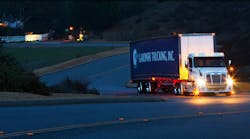Despite a chorus of opposition from fleet owners who had already complied with California emissions rules for trucks and buses, the California Air Resources Board (CARB) approved with little change a package of proposed changes to give small fleets and certain other fleet operations more time to comply with its Truck and Bus Rule.
CARB’s April 25th approval followed a lengthy hearing on April 24th in which many truck owners complained bitterly that it was unfair for CARB to ease compliance rules when they had spent the money to comply.
Several carriers argued that allowing non-compliant carriers the relief CARB proposes puts compliant carriers at a competitive disadvantage as those that haven’t complied can charge lower rates.
A few days before the hearing, the California Trucking Assn. (CTA) had slammed CARB for two of its proposed changes: Rolling back requirements for non-compliant truckers who had been denied for a loan and for the second and third trucks in small fleets.
“The majority of the opposition to these delays has come from small fleets who have complied at great cost,” said Shawn Yadon, CEO of CTA. “It’s unacceptable for CARB to pull the rug out from underneath them now.”
CTA noted that CARB’s Truck and Bus Rule had been effect since 2008 and that a majority of truckers had already taken at least some steps needed to be in compliance.
The association estimates that compliant truckers have approximately 15% to 30% higher costs than non-compliant ones.
Ultimately, CARB did make some changes-- but not many.
The board held firm on its delay in the small- fleet compliance deadlines by giving fleets another two years to bring their second truck into compliance and two more years to upgrade or replace a third truck.
On the other hand, the board did shorten the proposed compliance deadline for fleets that had been denied loans for upgrades.
Initially, CARB staff had proposed to give such operators another four years through 2018. As proposed by CARB member Sandra Berg, the board cut the additional time by two years, requiring them to be in compliance by the end of 2016.
A few other tweaks – including potentially some additional credit for fleet owners who have complied -- could be included in the CARB staff’s final draft, which is expected within two weeks.
For many truckers speaking at the April 24 hearing, any easing of the compliance requirements was unacceptable.
A typical sentiment was voiced by Shellie Archer, owner of 64-truck Archer Trucking in Ukiah, CA,
"I spent hours and hours fighting the rule -- fighting what is in existence right now," Archer said. "All the things you are proposing today in the amendments, we begged for those things. For over four years, we begged. You said no as a board. It was absolutely 'This is the rule. This is the law.' And my husband and I stepped up, and we are over $3 million in debt… And now my competitors who have not complied are getting the golden ticket. I am getting slapped in the face because I complied and made the investment.”
Archer argued that the fairness issue becomes very clear when you consider one-truck operations. Archer Trucking uses about 60 owner-operators of individual trucks, she said. About half have complied by retrofitting a diesel particulate filter or by buying a new truck. But the other half haven’t and are getting away with it.
The compliant trucker has a $2,300 a month payment while the non-compliant trucker does not, but they are making the same amount of money, Archer said.
“They need a check or they need a tax credit; I need a check or I need a tax credit,” Archer told the board. She also called on California to use the truck registration process to verify compliance with CARB’s Truck and Bus Rule rather than put the burden on companies that use owner-operators.
In a hearing that ran about four hours, a number of very small operators echoed Archer’s concerns over fairness, while some argued in favor of relief for various reasons.
But not all operations speaking up were small. Tom Lanting, president of Ontario, CA-based Gardner Trucking, reminded CARB that its mission was to protect public health and welfare.
“We spent $55 million to comply with your laws and regulations,” said Lanting, whose company operates more than 1,700 power units in California. “We have done our job. We expect that you folks do your job and protect the well-being and health of the children of this state. We are on board; you need to be on board, too.”
In its April 25 business meeting, CARB staff addressed some of the issues raised by Archer and others.
Per CARB, the agency has few options for rewarding truck owners that are compliant and it is bound by statute to meet certain emissions thresholds. Any tax credits or additional financial incentives would require legislation. On the enforcement issue, staff suggested that linking compliance with registration might be desirable, but that also would require legislation.
Staff did float one option for rewarding compliant fleets that is within CARB’s authority: Giving operators currently in compliance until 2020 to upgrade or replace remaining trucks. CARB could not go beyond 2020 under existing law.
The problem with this approach, however, is that it substantially reduces the particulate matter-reduction benefits of the Truck and Bus Rule.
The changes already proposed would reduce those benefits to about 93% of the original rule. The additional change, which was not adopted, would have reduced the benefits to 86% of the original rule.
Click here for video and audio recordings of the April 24-25 CARB sessions.



